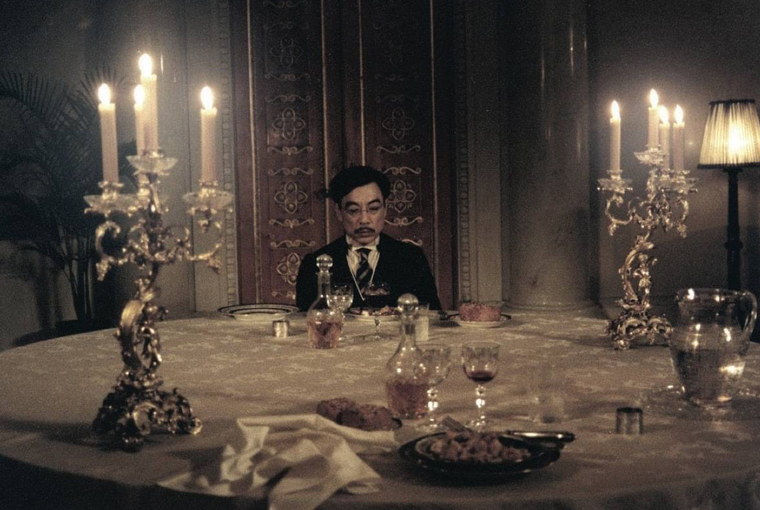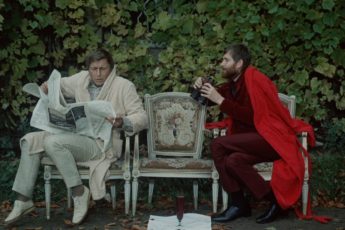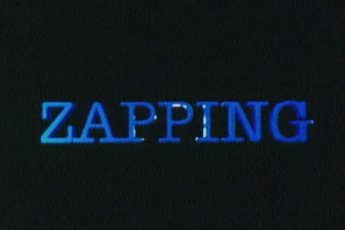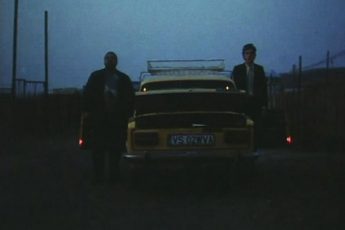A Portrayal of Power
Alexander Sokurov’s The Sun (Solntse, 2005)
Vol. 9 (September 2011) by Konstanty Kuzma
After his much discussed portrayals of Hitler in Moloch (1999) and Lenin in Taurus (2001), Russian director Aleksandr Sokurov illustrates Emperor Shōwa in his film The Sun from 2007 as the 3d piece in his cinematic series on power. Emperor Shōwa – better known under his personal name Hirohito – served as the emperor of Japan from 1926 until his death in 1989. The film is set during the last weeks of the 2nd World War and in the early postwar period, following the protagonist in a period in which Japan was forced to give up its imperialist efforts and admit defeat. But similarly to Moloch and Taurus, there is no fighting or elaborate political processes depicted in the film – what Sokurov is approaching is a private person, not a public one (although obviously, in the case of politicians public appearance can never be fully blanked out).
In fact, there are only 2 ways in which Sokurov explicitly refers to the political processes taking place. Firstly, through a brief scene of a meeting of the political and military decision-makers of Japan in Hirohito’s bunker during the last weeks of the war. Secondly, through two meetings taking place after the war between Hirohito and Douglas MacArthur- the general who oversaw the occupation of Japan in the immediate postwar period. The meetings between Hirohito and Douglas MacArthur have a powerful psychological dimension, as there is little room for consensus between the two. Instead of having an official meeting, the postwar arrangements are communicated through provocations and insinuations – MacArthur dictates the language to be spoken (English), as well as subject, manner and direction. But as I have already stated, these scenes dealing with political issues – although very suitable for discussion – are secondary and over-shadowed by Hirohito’s personality, towards which I’d like to direct the argumentation.
In a way, Sokurov follows a well-known principle in his film: the myth of a man is disassembled; Emperor Shōwa becomes Hirohito. However, unlike Hitler or Lenin, Sokurov deals with a blank page in The Sun, at least with regard to a Western audience. This notion seems to add to Sokurov’s artistic freedom, but undoubtedly, it also generates a certain responsibility towards the audience and the person he is depicting, as for many viewers this film is an introduction to Hirohito’s character, rather than a re-adjustment (as would be the case with Hitler or Lenin). A viewer unaware of the implications of The Sun may regard the film as a sound historical biography. But unlike Moloch, the illustration of the protagonist in The Sun is not canonized by history- it is rather ambiguous and unclear what role Emperor Shōwa was playing in the years of his reign (particularly regarding the imperialist stance of Japan in and before the Second World War). Thus, the sole fact of putting a film about Emperor Shōwa beside portrayals of Hitler and Lenin is a daring proposition many historians will disagree with. I do not want to revise the statement that in his series on power, Sokurov is treating his protagonists inwardly rather than outwardly, but I find it important to stress that The Sun stands rather aloof from the previous two films of his series on power, because here we are dealing with an examination of a character we are not familiar with, as opposed to observing a series of actions that might conflict with our previous ideas on a familiar character.
Of course, one could argue that both the historical and artistic discourse dealing with dictators are generally coined by a certain fascination with the mind of the tyrant. Still, it seems that with Hitler this discourse is rather directional: we ought to find out where such limitless evil can root in the mind of a single human being. Thus, already the image of Hitler praying or conducting everyday activities seem vulgar and conflicting with the image that we project onto him (in Moloch it is the act of love and Hitler using the bath room during a leisurely weekend trip). Factually – anatomically – Hitler is a human being, but we do not address questions concerning his person with regard to this fact. Hitler is a tyrant, a war criminal, a lunatic; not a lover of opera. Emperor Shōwa on the other hand is not an open book – the conflict in the movie is intrinsic to the actions depicted on screen – we have no foregone verdicts guiding our opinion. Observing Emperor Shōwa carrying out an everyday act will itself not provoke any immediate response.
Nevertheless, Sokurov does follow Emperor Shōwa carry out everyday acts, and it is for a good reason. Dinner scenes for one are of course not reserved to films about Hitler or Mussolini. Sokurov’s illustration of Hirohito is that of a man who appears rather childish and naive, a man whose authority is so sluggish that it almost feels like Hirohito is the one carrying out orders, not his underlings. His servants not only instruct him about his daily schedule, but likewise about adequate opinions regarding Japan and the position of the emperor at the top of the hierarchy. Thus, showing him during his daily routine adds to the accessibility of his person. Furthermore, Sokurov indeed succeeds in creating highly responsive scenes through the depiction of simple actions of the protagonist, because the beginning of the film is set during the Second World War. In fact, possibly the most intensive moment in the entire film is a sequence when Hirohito steps out of the bunker he is hiding in to pursue his hobby – biology (Emperor Shōwa was really a biologist and published several papers under his personal name – mostly about marine biology). With the sound of airplanes buzzing above his head, he holds a monologue on the behavior and anatomic features of a hermit crab that leads to a rant on completely unrelated, political issues.
Indeed, there is a psychological feature of Sokurov’s Hirohito that sets him apart from the protagonists of Moloch or Taurus: Emperor Shōwa has a biting problem with power. He feels responsible for being in power, but it seems like he is more attached to the notion of being in power than power itself. Hirohito asks his servants to see him as a human being – prompting them to compare his body to that of ordinary people – instead of admitting to his god-like status. The megalomania of the “tyrant” becomes inverted into sickly sycophancy. It is arguable where the docile refusal of power roots according to Sokurov. Speaking out of a historic context, it might have been sheer convenience: critics like Hirohito biographer Herbert P. Bix argue that he pretended to be unaware of the exact political happenings of the Japanese regime to elude prosecution by the post-war military tribunal of the American occupants. But there is no reason to believe Sokurov’s film is suggesting a historic interpretation. The sketchy political context is secondary to the film, and brings no notable impulses into the story.
Hirohito is defined by his public image, and in the story Sokurov is trying to tell us, it seems to be this set of over-whelming expectations towards him that finally lead to his self-denial (this dimension draws a parallel to King George VI in Tom Hooper’s King’s Speech; interestingly, both characters have an explicitly stressed disorder related to their oral region suggesting a problem with self-expression). Not only Hirohito’s fascination with nature is made elaborate (be it his interest in biology or his poetic attitude towards all living beings in the film) – which gives a naive and pure dimension to his character -, also, he is constantly failing to act according to the rules of society, let alone the rules of being an emperor (in one of his meetings with general MacArthur, he dances around the room and douses the candles on the dinner table when MacArthur leaves the room). In this sense, the film rather speaks on the impact of involuntary power on a person, than on the image of a person voluntarily empowered (Moloch, Taurus). As he admits to his wife, Hirohito cannot bear the burden of trying to be what he is seen as, and so with the pressure of the American occupants, he officially resigns from his formal divinity (Sokurov is again referring to a historic fact which was the declaration Hirohito gave on January 1st 1946, in which he explicitly rejects that the Emperor of Japan is an incarnate divinity, which until then was formally accepted among the Japanese). In the film, the resignation from his divinity thus becomes a symbolic act to satisfy his own motives, not that of the American occupants whose pressure on him only serves as a catalyst for his decision.
Still, the question of Emperor Shōwa’s role in the Japan’s imperialist policies remains. Indeed, it is one that Sokurov leaves open. To put it bluntly, the question of guilt is irrelevant. The Sun is not politically inarticulate, it is simply not a political (or historical) film. Rather, Sokurov engages in a portrayal of the concept of power; of alienation with the outer world that goes beyond the rehearsed routine of gestures between the “tyrant” and his servants that are so imminent in this film. Whatever the subtle political implications of the story might be, Sokurov depicts an infantile man who does not fit into the role of an emperor (suicide is never mentioned as a possible choice for the emperor himself, although the film does end with a suicide that again seems to stress that the question of guilt cannot be answered through this film).
Critics have argued that The Sun is not a psychological film, but I do believe that Sokurov was intending to do a character study with his piece, and I furthermore believe that he has succeeded in delivering one. Hirohito remains a undecipherable character not because Sokurov did not approach him thoroughly , but because some characters (and Viorel in Cristi Puiu’s Aurora has proven that) are not fully decipherable…
Regarding the realization of the film, Sokurov was clearly facing a difficult shooting since he was not able to dub Russian actors for the The Sun, which is a technique he applied for Moloch (although admittedly there, the final product is far from being perfect). Sokurov has shot 3 films in Japan (1996-1999) before, but neither of them was as reliant on dialog as The Sun. From the very beginning of the movie, the characters seem rather lost on screen, which initially gives the impression that the actors do not feel comfortable in their roles (or that the viewer does not feel comfortable with them acting), but the resulting awkwardness somehow seems adequate regarding the atmosphere of war-torn Japan. Issei Ogata’s impression of Hirohito is well-rehearsed, but overall lacking the subtleness that might have given the movie a more diversified psychological experience. The camera work (conducted by Sokurov himself) on the other hand is rather reserved. It is kept in gray tones, only as the film advances does Sokurov’s tragic figure appear in natural lighting. This relative lack of the presence of the sun in the film reflects Hirohito’s utopian wish for a life in harmony with nature – no place on earth being further away from the fulfillment of his desire than postwar Japan…




Leave a Comment